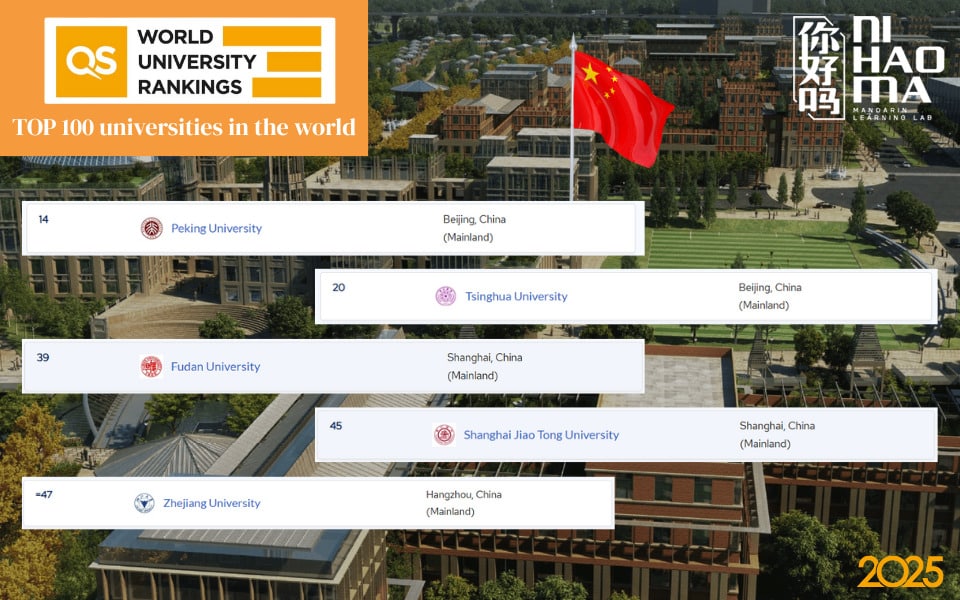Are you curious about whether you fulfill the prerequisites for studying in China? As the world’s second-largest economy, China’s rapid growth is well-known, and it also stands out as an attractive academic destination for those studying in China from around the globe. Therefore, what preparations are necessary for studying in China? Let’s explore this with Ni Hao Ma now!
Reasons to study abroad in China
Currently, many countries around the world have established strategies to attract international students as part of their soft diplomacy policies. Among them, China is gradually emerging as an attractive study destination not only for Asian students but also for those from other continents, for the following reasons:
Quality of Education
Over the past few decades, China has invested heavily in the education sector, especially in higher education and scientific research. A series of key universities such as Peking University, Tsinghua University and Fudan University are highly ranked in global rankings like the QS World University Rankings and Times Higher Education.

Affordable Costs and Numerous Scholarships
Compared to countries like the United States, the United Kingdom, or Australia, the cost of studying and living in China is considered quite affordable. Moreover, the Chinese government has implemented many attractive scholarship programs for international students, including government scholarships, Confucius Institute scholarships, and individual university scholarships.
These financial aids significantly reduce the financial burden for international students, opening up opportunities to access quality education for a wider range of individuals. Especially for students from developing countries, these scholarships create opportunities for them to achieve their dreams.
China’s Economic Advantages
Studying and living in China helps international students better understand the new trends in one of the world’s largest economies. This is a significant advantage when they return to their home countries or work for companies related to the Chinese market. Language skills, cultural understanding, and practical experience will be major plus points in the eyes of employers.

Diverse Career Opportunities
China is home to the headquarters or branches of numerous technology conglomerates and multinational corporations such as Alibaba, Huawei, Tencent, ByteDance (TikTok), Lenovo, etc. Studying in China facilitates students’ access to internship opportunities, participation in research projects, or employment after graduation.
Entry Requirements for Studying in China
More and more Vietnamese students are choosing China as their study destination. The main reasons for this trend are its close geographical location, cultural similarities, and high quality of education. In general, the requirements and conditions for studying in China typically include:
General Requirements
- Nationality: Applicants must be non-Chinese citizens with a valid foreign passport.
- Health: Applicants must be in good physical and mental health.
- Criminal Record: Applicants typically must have no criminal record.
Academic Requirements
- High School Diploma: For bachelor’s degree programs, a high school diploma or equivalent is required.
- Bachelor’s Degree: For master’s degree programs, a bachelor’s degree is necessary.
- Master’s Degree: For doctoral degree programs, a master’s degree is usually required.
- Academic Performance: Good academic performance in previous studies is generally expected, often with a minimum GPA requirement (e.g., 7.0 or above for bachelor’s).

Language Proficiency Requirements
Study programs for international students in China are divided into programs taught in English and programs taught in Chinese.
Chinese Language Proficiency Requirements
HSK (Hanyu Shuiping Kaoshi) is an international standardized test that assesses the Chinese language proficiency of non-native speakers. This is often a mandatory requirement for programs taught in Chinese, helping universities ensure that students have sufficient language skills to keep up with the curriculum.
- Minimum HSK Level 4 for undergraduate programs.
- HSK Level 5-6 for master’s and doctoral programs.
- HSK certificate must be valid at the time of application.
English Language Proficiency Requirements
For programs taught entirely in English, the HSK certificate is usually not required. Instead, universities will require an English language proficiency certificate to ensure students can understand and participate in the learning process.
- IELTS from 5.5 – 6.5 for undergraduate programs (depending on the major) and 7.0 for postgraduate programs.
- TOEFL iBT minimum score of 80 for undergraduate programs and 100 for postgraduate programs.
- TOEIC 650 and above.
- Some universities also accept other certificates such as the Duolingo English Test (DET), International English Test (IET) or internal tests.
Financial Requirements
When studying in China, financial capability is an important factor that universities and scholarship programs will consider to ensure you can afford to study and live stably there.
- Proof of Funds: Applicants need to provide evidence of sufficient financial resources for the duration of their studies in China. Applicants are usually required to have a bank savings account with a balance ranging from 3,000 – 10,000 USD (depending on the level and duration of study). Some universities also require a financial guarantee letter from a sponsor (parents or other sponsors).
- Living Expenses: Living expenses also vary between cities. Major cities like Beijing and Shanghai usually have higher costs, estimated at around 1,000 – 1,200 USD per month.
- Tuition Fees: Tuition fees vary depending on the university, program, and level of study. For example, undergraduate tuition fees at Peking University range from 2,000 to 5,000 USD per year.
Documents for Studying in China
After choosing a university and study program and verifying that you meet all the admission requirements of the school, you need to prepare the following documents:
- Valid passport
- Birth certificate
- National identity card
- Notarized highest academic degree/diploma
- Chinese (HSK) or English (IELTS, TOEFL) proficiency certificate, depending on the language of instruction.
- Personal statement or letter of motivation. Research students may need a research plan.
- Letters of recommendation for master’s and doctoral programs (usually 2 letters from professors or associate professors).
- Health check certificate (depending on the university).
- Criminal record check (depending on the university).
- Proof of financial resources.
- Application form (usually submitted online).
- Application processing fee
- Other documents as required by the university and program.

Top Universities in China
In recent years, China has not only emerged as an economic powerhouse but has also become an attractive educational destination for international students. With strong investment in its higher education system, the country is increasingly asserting its position through prestigious international rankings such as the QS World University Rankings and Times Higher Education.
China’s top universities not only boast modern facilities and excellent faculty but also offer many attractive scholarship opportunities for international students. So, which are the most prestigious universities in China today?
| University Name | City | Undergraduate Tuition (USD/year) | Remarks |
|---|---|---|---|
| Tsinghua University | Beijing | 4.000 – 8.000 USD | Top 1 in Asia, renowned for Engineering, Technology, Economics |
| Peking University | Beijing | 4.000 – 7.500 USD | Strong in Social Sciences, Medicine, Law, Economics |
| Fudan University | Shanghai | 4.500 – 8.000 USD | Notable for Communication, Economics, Management |
| Shanghai Jiao Tong University (SJTU) | Shanghai | 4.000 – 8.500 USD | Very strong in Engineering, Computer Science |
| Zhejiang University | Hangzhou | 3.500 – 7.000 USD | Comprehensive strength, attractive scholarships |
| Renmin University of China | Beijing | 3.800 – 6.500 USD | Specializes in Law, Economics, Sociology |
| Nanjing University | Nanjing | 3.500 – 6.000 USD | Long-standing institution, strong in Natural Sciences |
| Wuhan University | Wuhan | 3.000 – 5.500 USD | Beautiful campus, diverse programs, CSC scholarships |
| Beihang University (Beijing University of Aero. & Astro.) | Beijing | 4.000 – 7.000 USD | Engineering, High Technology |
| Huazhong University of Science & Technology (HUST) | Wuhan | 3.000 – 5.000 USD | Notable for Technology and Medicine |
Conclusion
Every year, thousands of international students have turned their study abroad dreams into reality – and you can absolutely be one of them. Understanding the requirements for studying in China is the first important step on your journey to conquer your academic aspirations in the world’s most populous country. Hopefully, Ni Hao Ma has provided you with useful information to better prepare for studying in China!



